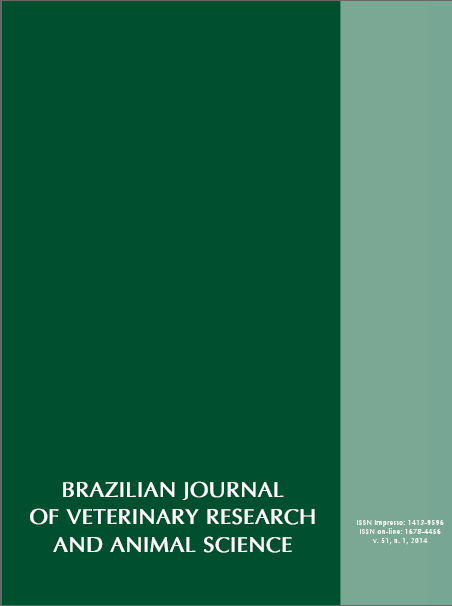Isolation of Leptospira borgpetersenii in synanthropic Didelphis albiventris in Jaboticabal, São Paulo, Brazil
DOI:
https://doi.org/10.11606/issn.1678-4456.v50i6p457-461Keywords:
Isolation, Leptospira spp, Brazilian marsupials, MLVAAbstract
Leptospirosis is a waterborne disease and, therefore, stands out for the possibility of environmental contamination, the cross transmission between domestic and wild animals and humans. Opossum species are important reservoirs of this disease making them potential pathogen spreaders. Aiming to verify the presence of Leptospira spp. and the antibodies against Leptospira spp. in the Campus of São Paulo State University, in Jaboticabal, São Paulo, Brazil, freeliving wild life opossum (Didelphis albiventris) were captured for blood and urine sampling. Serological analysis was performed Microscopic Agglutination Test (MAT). Aliquots of urine were seeded in media Ellinghausen-McCullough- Johnson-Harris (EMJH) and Fletcher without antibiotics. The samples in which there was growth of leptospires were forwarded to the Leptospirosis Laboratory of the Institute of Pathobiology in the National Institute of Agricultural Technology, Buenos Aires, Argentina and were genotyped using Multiple Locus Variable number tandem repeat Analysis (MLVA). Of the 15 analyzed animals, nine (60.0%) were reactant to Patoc serovar. The pathogenic specie Leptospira borgpetersenii was isolated and identified in three Didelphis albiventris. The isolation findings of pathogenic specie Leptopsira borgpetersenii in the urine culture of three Didelphis albiventris in a university campus are a major discovery in the area of preventive veterinary medicine and public health and open a discussion about the important role of free-living wild animals as reservoirs of this agent to domestic animals and humans, a condition that serves as a warning for the improvement of health practices.Downloads
Download data is not yet available.
Downloads
Published
2013-12-09
Issue
Section
ARTICLES
License
The journal content is authorized under the Creative Commons BY-NC-SA license (summary of the license: https://
How to Cite
1.
Silva FJ da, Silva TR, Silva GCP, Santos CEP dos, Alves Júnior JRF, Mathias LA. Isolation of Leptospira borgpetersenii in synanthropic Didelphis albiventris in Jaboticabal, São Paulo, Brazil. Braz. J. Vet. Res. Anim. Sci. [Internet]. 2013 Dec. 9 [cited 2026 Jan. 18];50(6):457-61. Available from: https://revistas.usp.br/bjvras/article/view/63167





